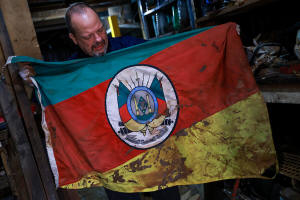Waterborne illness now threaten flood-ravaged southern Brazil
 Send a link to a friend
Send a link to a friend
 [May 31, 2024]
By Diego Vara [May 31, 2024]
By Diego Vara
PORTO ALEGRE, Brazil (Reuters) - Waterborne diseases are now a risk in
Brazil's southernmost state, authorities say, as residents begin to
return to flooded homes and clean up after catastrophic floods that
killed at least 169 people.
Rains that started in late April swelled several rivers and lakes in Rio
Grande do Sul state to record highs and more than 580,000 people were
driven from their homes by the flooding, according to state officials.
Leptospirosis, a disease largely caused by the presence of urine of
infected rats in standing water, is currently health officials' biggest
concern, said the head of the state's health surveillance center,
Roberta Vanacor, adding there had been a rise in cases in recent weeks.
Since the rains began, seven people have died from the disease. Another
10 deaths are under investigation as possibly caused by the disease.
There have been early 2,300 potential cases reported, of which 141 were
confirmed, according to the state's health authorities.
To cope with the high demand for medical care, four field hospitals have
been set up in the state, as well as mobile teams, which have already
assisted thousands of people.
According to the health ministry, the floods have allowed the
leptospirosis bacteria to flourish, facilitating outbreaks of the
illness.
And as residents return to their homes, they may find an additional
danger. "Snakes, scorpions and spiders, these venomous animals will also
seek shelter from rainwater in drier places," said Vanacor.
Officials are also warning of the mental toll the destruction has
caused.
[to top of second column]
|

Antonio Carlos Zaba shows a mud-stained Rio Grande do Sul flag as he
cleans his house partially destroyed after flooding in Porto Alegre,
Rio Grande do Sul, Brazil, May 30, 2024. REUTERS/Diego Vara
 "There's a certain fragility to this
moment for the population," said Lieutenant Colonel Mauricio
Specterow, who heads a field hospital in the state capital of Porto
Alegre.
One such person coming back was Joyce Fauth Correa, who burst into
tears as she entered her home in the neighborhood of Navegantes,
armed with rubber gloves and waders.
Floodwaters, which she said had came up to her shoulders, have now
receded to a thick layer of mud over the whole house.
"You see everything you've achieved, that you've fought (to have),
all your history, go to waste."
(Reporting by Diego Vara; Writing by Peter Frontini; Editing by
Kylie Madry and Frances Kerry)
[© 2024 Thomson Reuters. All rights reserved.]This material may not be published,
broadcast, rewritten or redistributed.
Thompson Reuters is solely responsible for this content.
 |